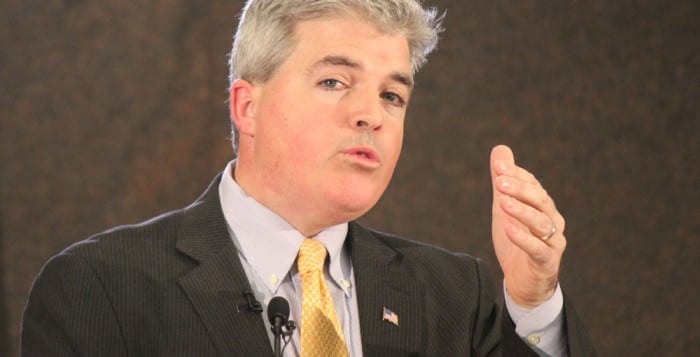Bellone focuses on Connect Long Island, water quality
By Julianne Cuba
At his fourth State of the County address, Suffolk County Executive Steve Bellone began by ensuring the county government and public that he has never been more optimistic about the current state of the region and its future.
At the William H. Rogers Legislative Building in Hauppauge on March 26, Bellone (D) also took time commending the county legislature for successfully and efficiently reducing government by more than 10 percent — an initiative that will save Suffolk County taxpayers more than $100 million a year. The county executive announced that when he took office three years ago, the unemployment rate for Suffolk County stood at 8.2 percent. As of the end of 2014, it stands at 4.2 percent.
However, Bellone continued, “I’m not here to talk about where we are today. I am much more interested in talking about where we are going and what the future could look like.”
In order to combat what Bellone said he considers the fundamental issue of our time — a two-decade trend of losing young, qualified and educated people to other regions of the county — he pointed to the county’s economic development plan, Connect Long Island.
“We cannot reach our economic potential, we cannot build a more prosperous future, if we are not a region that can attract and retain the young, high-knowledge, high-skill workers necessary to build an innovative economy,” he said.
Connect Long Island will make progress on the five crucial issues that are driving young people away, which, according to Bellone include high costs, lack of transportation options, lack of quality affordable rental housing, lack of affordable housing in desired environments and a lack of high-paying jobs.
“We build walkable, transit-oriented downtowns that have strong, public transportation links to one another and to universities, research centers, job centers and parks and open space. Effectively, what Connect LI will do is to build a quality of life ecosystem that will be attractive to young people,” he said.
But, unfortunately, Bellone said, the lack of sewage systems in many of Suffolk County’s downtown areas — which are critical parts of the region’s future — is limiting the opportunity for growth.
Suffolk County’s sewage problem impacts not only the regions economic development but its water quality as well. The water quality issue was one of the three major problems on which Bellone focused.
“We have 360,000 unsewered homes in Suffolk County — that is more than the entire state of New Jersey. Those 360,000 homes represent, potentially, 360,000 customers. So I’m happy to report that four companies donated 19 systems, which we are putting into the ground to test under local conditions. At the same time, with the leadership of Southampton Town Supervisor Anna Throne-Holst and Dr. Samuel Stanley, [Stony Brook University] will begin a new program to identify the next generation of septic technology, with the goal of providing better, more cost-efficient options for Suffolk County residents,” Bellone said.
Bellone announced that with the help of Gov. Andrew Cuomo (D), the county’s state and federal partners, and U.S. Sen. Chuck Schumer (D-NY) and Sen. Kirsten Gillibrand (D-NY), he was able to secure $383 million for one of the largest investments in clean water infrastructure in more than 40 years — the Reclaim Our Water Initiative.
Legislator and Minority Leader Kevin McCaffrey (R) said that he agrees 100 percent with everything the county executive said in regard to economic development and improving drinking water. However, he added that the county’s debt must be cut and the legislature needs increased oversight.
“We must ask ourselves if we are going to control the irresponsible and reckless spending and borrowing, we must become more focused on the county’s ever-increasing debt,” McCaffrey said. “We must ask ourselves if we want to throw debt on the backs of our children and our grandchildren. It’s time to cut up the credit cards and learn how to live within our means.”







